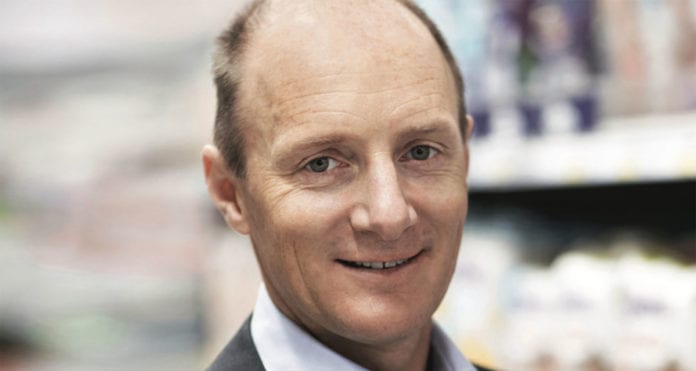Tissue’s leading executives chart the challenges and responses to the Covid-19 effects across the globe – Essity’s president and chief executive Magnus Groth, Kimberly-Clark North America president Kim Underhill, and Georgia-Pacific’s Consumer Products Group, senior vice president and general manager, tissue category, Vivek Joshi.
In July, Essity reported its half year results stating increased market shares in many markets, increased online sales, but added that sales were negatively impacted by Covid-19 and related lockdowns. Year-on- year, net sales for the period decreased 1.0% to SEK62,119m. In the second quarter, net sales declined 11.4%. Yet the Covid-19 pandemic, it added, may lead to increased demand for its hygiene and health products as a result of increased awareness of the importance of hygiene and health.
TWM interviewed Magnus Groth, president and chief executive.
TWM/1: With the impact on Essity’s results following the outbreak of the pandemic, what opportunities and increases in demand could you forecast for 2020 and 2021?
“To summarise the results of the second quarter, we had a strong performance in a challenging market. By strong performance I mean very good margins and strong overall operating profit.
“And the challenging environment very much impacted the top line, so sales that were down significantly, 9.3%, and the big impact was in Professional Hygiene, whereas Consumer Tissue did better.
“What is worthwhile to look at is the first and second quarter combined. If you take out the stocking effects we had in March, and now the de-stocking in the second quarter in many parts of the world. And then practically the opposite in China where there was a lockdown in the first quarter and then a re-fill of the supply chain in the second quarter, then you see it’s not that volatile for Consumer Tissue, it’s quite stable.
“This is because people continue to use Consumer Tissue at a slightly higher rate because it is to some extent replacing Professional Hygiene tissue and there’s also an increased use of household towel because that’s seen as more hygienic.
“But then of course the big negative impact overall that has made very, very clear in the second quarter was the impact to Professional Hygiene due to lockdowns. Specifically, if you look at Essity’s product mix in Professional Hygiene, we have 39% of our Professional Hygiene sales from hotels, restaurants and catering in the HoReCa segments, which was very negatively impacted. And we have 26% of our sales from commercial building, offices and airports. In many parts of the world people are working from home and currently travelling less, which has also had a very negative impact.
“The third biggest sub-segment is public areas like schools that were also subject to lockdowns in many countries. So overall a big negative impact. And you can see that in the second quarter that Professional Hygiene declined 30%, whereas Consumer Tissue did better.”
TWM/2: What impact have you seen in other geographical areas where Essity is present, including Vinda in Asia?
“We’ve seen similar trends globally. The big impact in the first quarter when China was in lockdown and then a slow recovery as China opened up. But then a negative impact in other parts of South East Asia like Indonesia and the Philippines that went into lockdown in the second quarter. So you can almost follow the pandemic to see the impact on our sales.”
TWM/3: Do you see things opening up in Europe in terms of AfH?
“We saw a slight improvement in June but this will take time. People are still hesitant to go out and eat, and a lot of people are still working from home. It will take several quarters before it’s all normalised.”
TWM/4: How have you adapted to the supply chain challenges the pandemic presented?
“In February, we learned from our business in Asia, Vinda, that this was going to be serious and a real pandemic. We took a lot of their advice to quickly implement a lot of big changes in the supply chain to protect the business.
“We have three overarching principals during the pandemic – care for our people, secure business success, and contribute to society. If our employees feel safe, they will want to come to work. We have done big changes inside our plants, for example sectioning the plants and putting up screens between machines so that people working on different machines can’t interact. We also have a requirement for facemasks for all employees. We worked on the shift changes so that people don’t meet, and we have closed the canteens. And we haven’t allowed external visitors, suppliers or whoever. So very strict measures in the plants.
“Through that, we also learned to have a close dialogue with local and national authorities to make it clear that this is a critical business for society.
“Thirdly, we wanted to show that we contribute to society in different ways. And one example is that we started producing face masks to supply to authorities in Sweden, we started to produce three million face masks according to the surgical mask standard in just a few weeks’ time. So that was a fantastic effort from one of our small plants in Sweden.”
TWM/5: In the last three months, what increases have you seen in volume in Europe?
“Actually, overall not much extra volume during the last three months. It was significantly higher production in the first quarter for Consumer Tissue. But then we had a significant destocking effect in the second quarter and lower volumes, so it’s levelling out. With Consumer Tissue, consumption levels are 5-10% higher in the lockdown period. Whereas in Professional Hygiene there’s structurally lower demand because there’s the napkins, hand towels, etc, that are used in restaurants.”
TWM/6: With all the changes at Essity’s sites, will you go back, or is this the new way of doing business?
“That’s interesting as this answer will also impact our view on how quickly Professional Hygiene will come back.
“We are looking at this now. We just finalised a survey amongst 10,000 of our white-collar office employees and we found that they are highly motivated and engaged still working from home, they feel strongly committed to performing for the company even when working from home.
“There was also a strong signal that they miss their colleagues! So, my guess would be that we may return mostly to the offices but have a much greater flexibility for working from home.”
TWM/7: Do you expect tonnage to be steady over the next few months, even if parts of the world continue to see a second wave of the pandemic?
“I expect Consumer Tissue to be quite stable now. Consumers have realised that they don’t need to stockpile.”
“But it will take several quarters for Professional Hygiene to recover, because of the lower demand. A lot of distributors who have stockpiled products that needs to go through the system.
“On a positive note, and one possibly for the entire tissue industry, there’s a very strong demand to replace air dryers with paper hand towels, because of course they are blowing water droplets around the washrooms which is contrary to what we have learned to be safe from this pandemic.
“Some 20% of the hand drying market is supplied by air driers, that’s a big potential, both for replacements but also for replacing future needs.
“In the short term, this doesn’t help us very much because in many of the bathrooms where we’re replacing the air driers, there’s no traffic yet, because schools and offices are closed. But eventually as people come back, this will benefit the tissue industry.
“So in the long term, we expect this to confirm the use of tissue and towel products in wider areas of society, as well as products such as hand sanitisers and soaps.”
TWM/8: Do you expect to see further pulp price hikes this year?
“Pulp prices have been quite steady. We have been expecting some price increases from the fourth quarter last year, but we haven’t really seen them. We expect a slight increase maybe in the third quarter compared to the second – but with an emphasis on slight.”
TWM/9: In terms of e-commerce, do you forecast more and more people will start going online to buy their tissue and towel products?
“Yes, we’re seeing a big, big shift in terms of e-commerce. For Essity as a whole, our online sales increased from 11.5% of sales a year ago in the second quarter of 2019, to 14% this second quarter. So a big, big pick up. This is clearly the fastest growing channel and that goes for both for Personal Hygiene and Consumer Tissue.
“We’re seeing that consumers are using online more and more especially in lockdown. People are turning more to online channels when they’re working from home.”
TWM/10: What are the main opportunities and challenges for you and the tissue market in the next few months?
“For the main opportunities, we are very much focused on what we call the relative game. Because of volatility and uncertainty from external factors such as the Covid-19 pandemic, we are very much focusing on winning against our competitors and taking market shares. This means we will continue launching new products based on our innovations, we will continue to invest in advertising and promotion, and then also to benefit from smaller opportunities such as the air dryer replacements, kitchen towels, soaps and hand sanitisers. These are niche areas that are growing. Those are the opportunities. And of course, gaining market share.
“The main challenges are the big uncertainty and also especially for Professional Hygiene where I think we will see quite a subdued amount for some time. And then to adapt to that situation, and to be very, very flexible. It’s not unlikely that things will continue to go back and forth. As we see in some countries, they open up and then they’re closing down again. We will have to be very adaptable and flexible going forward.”

































